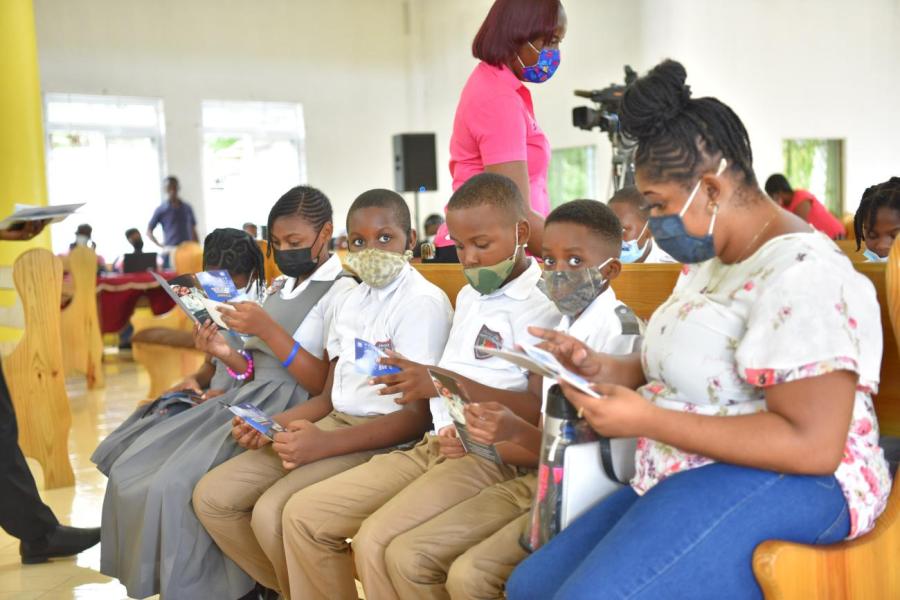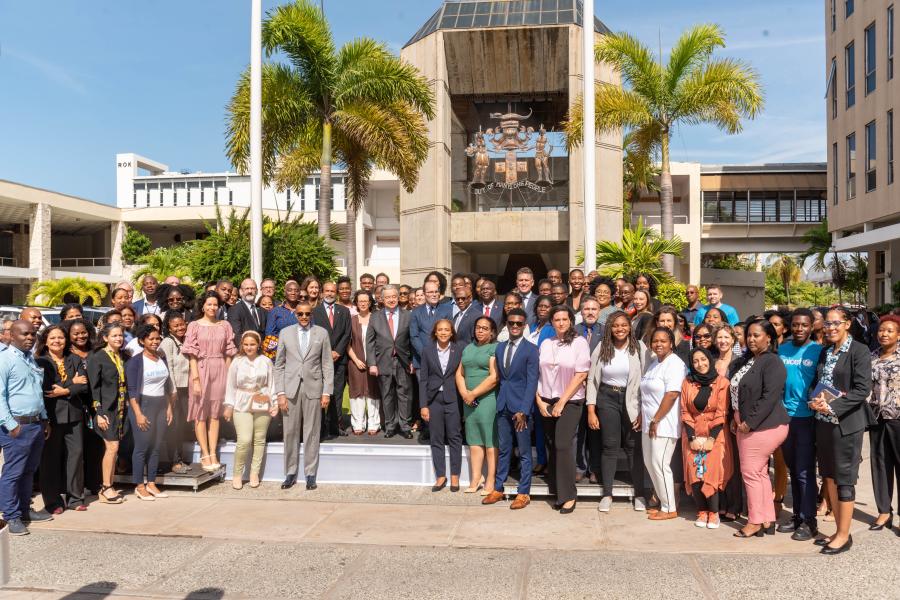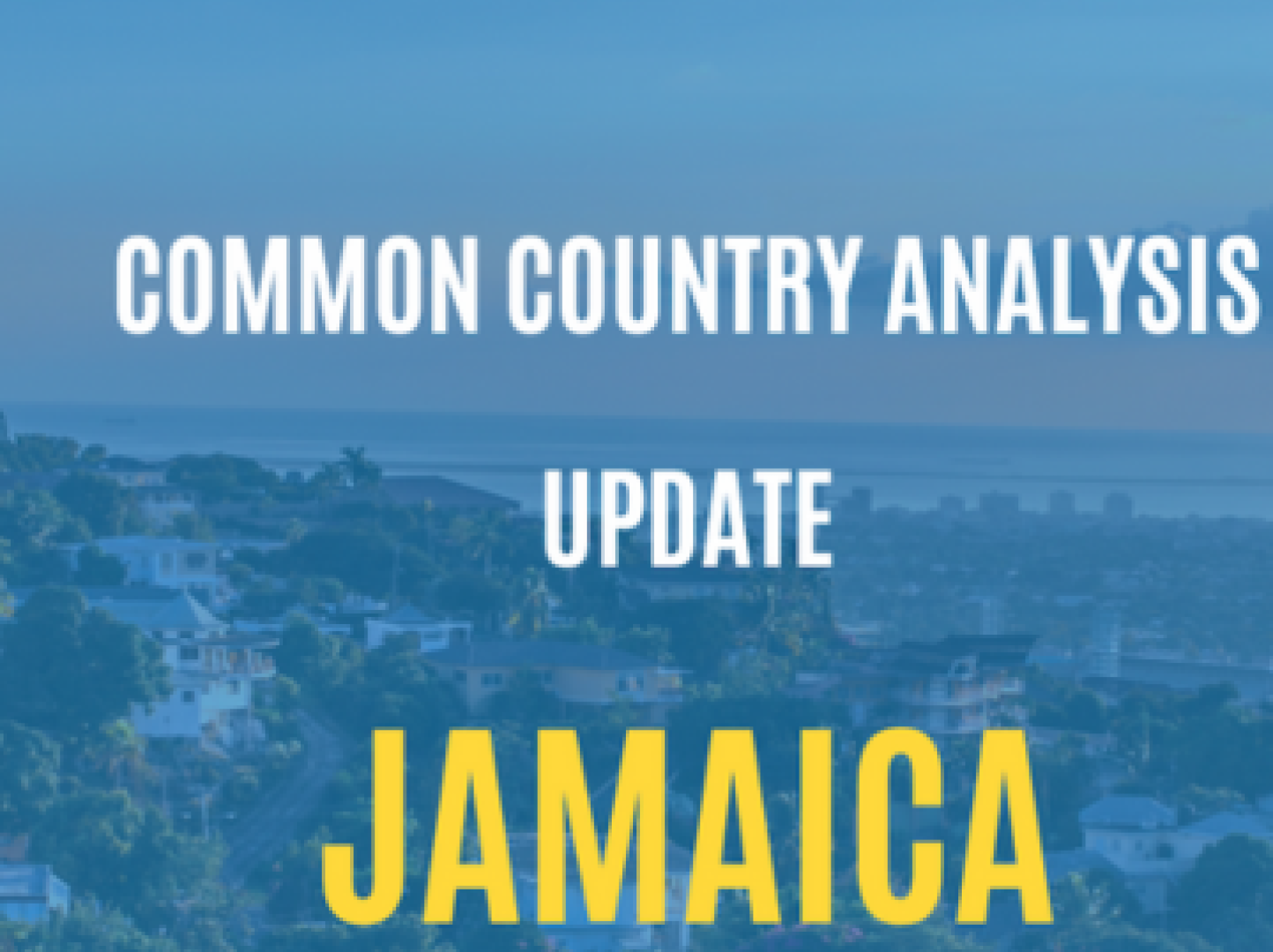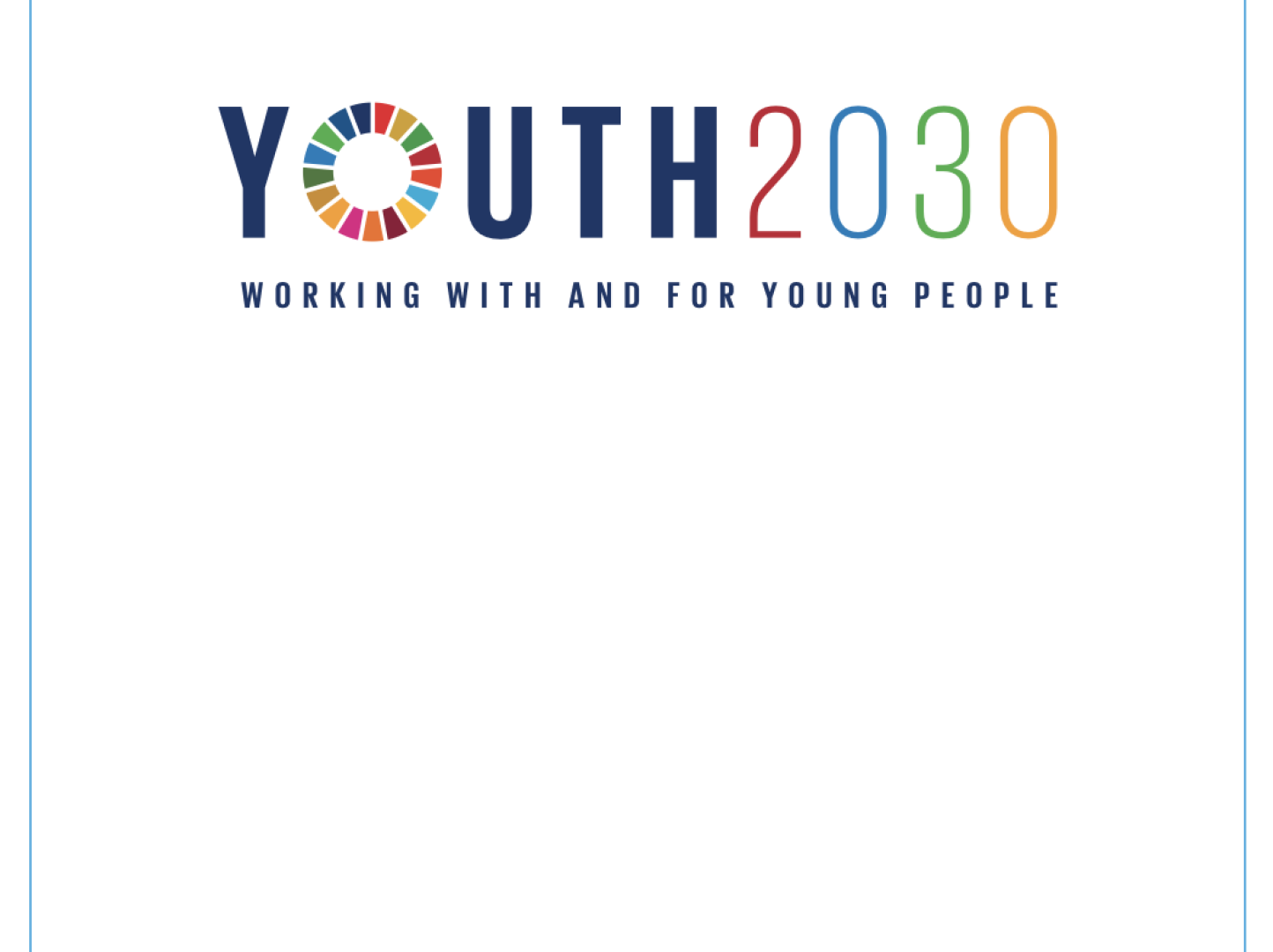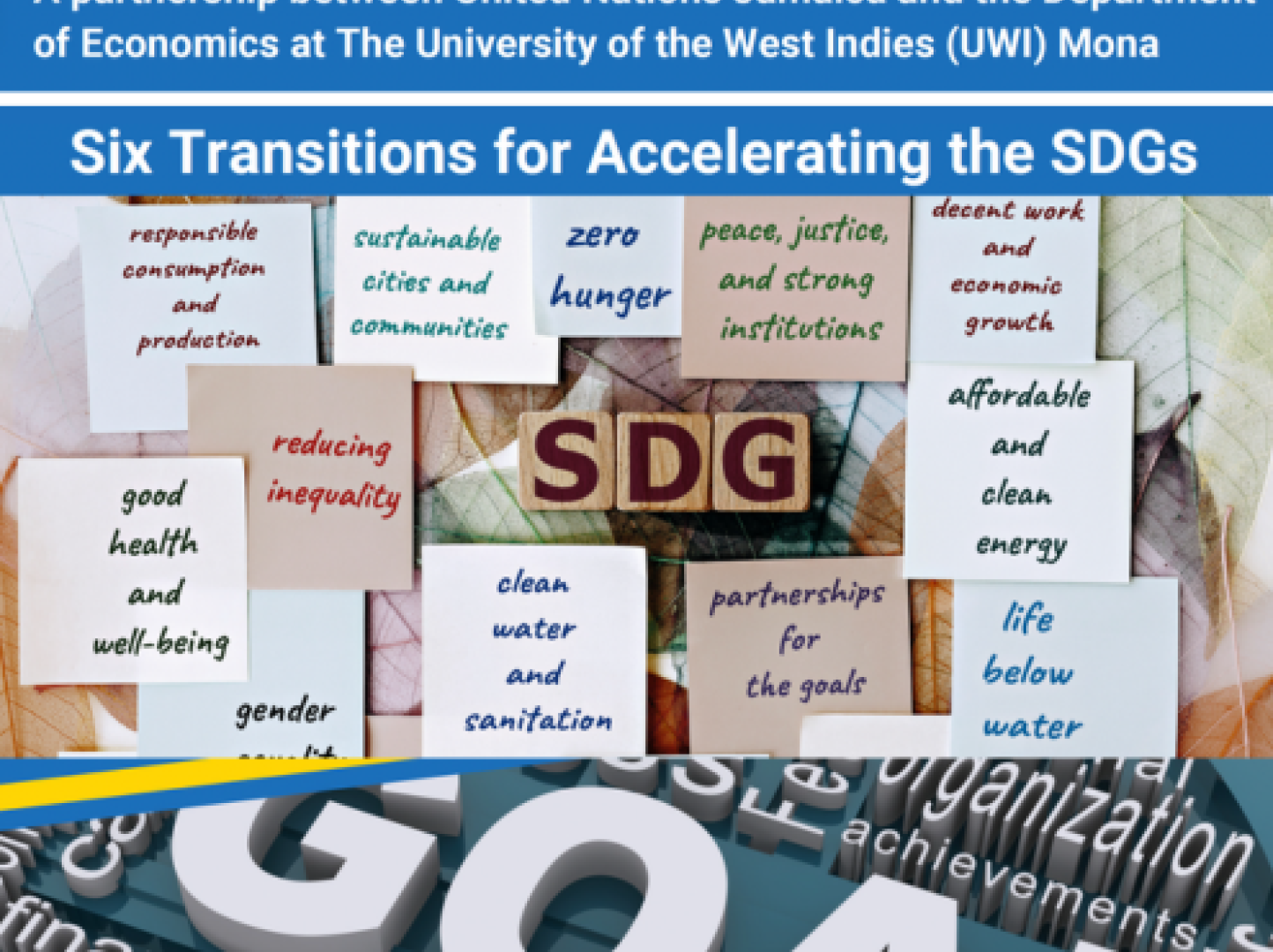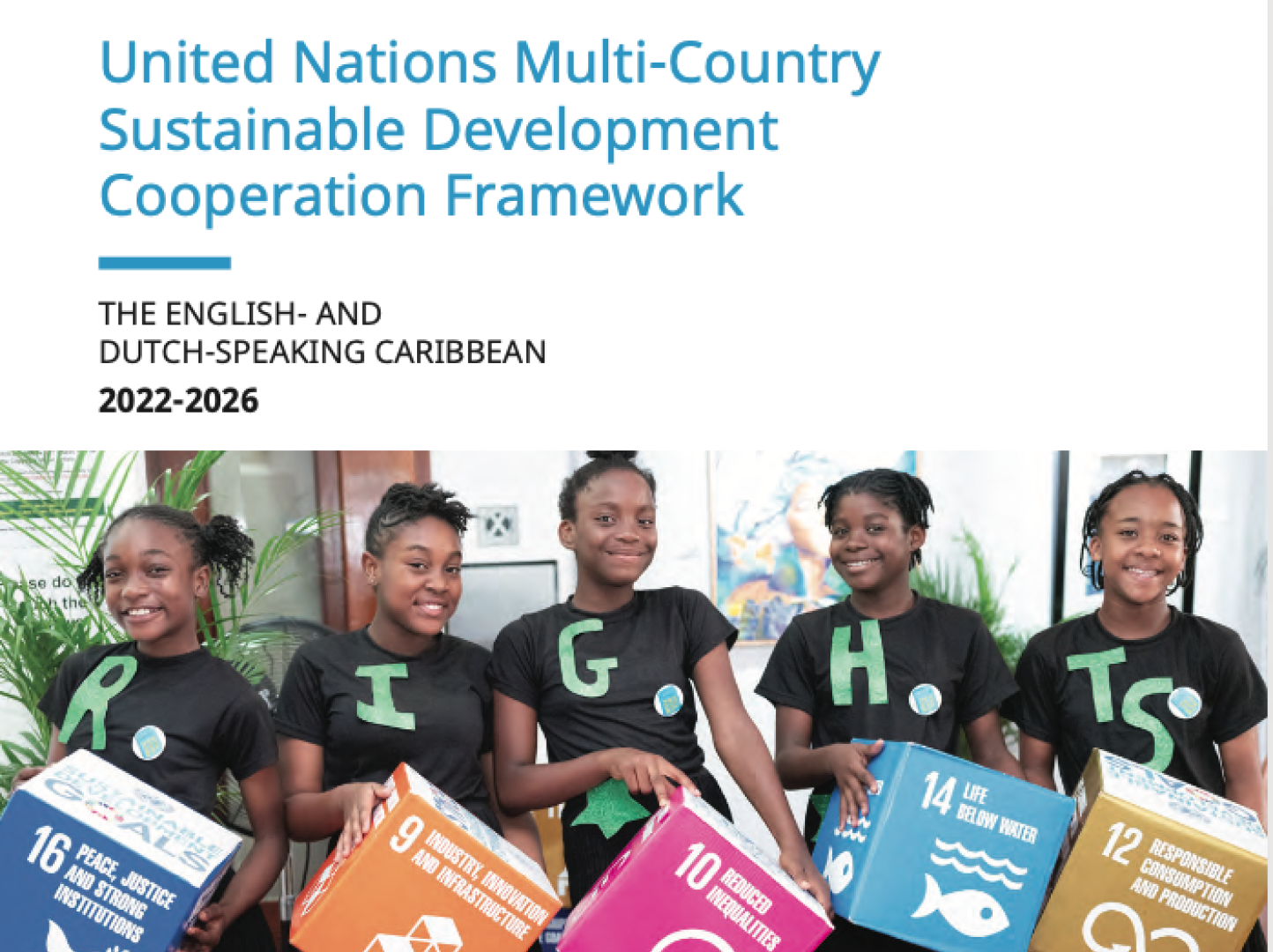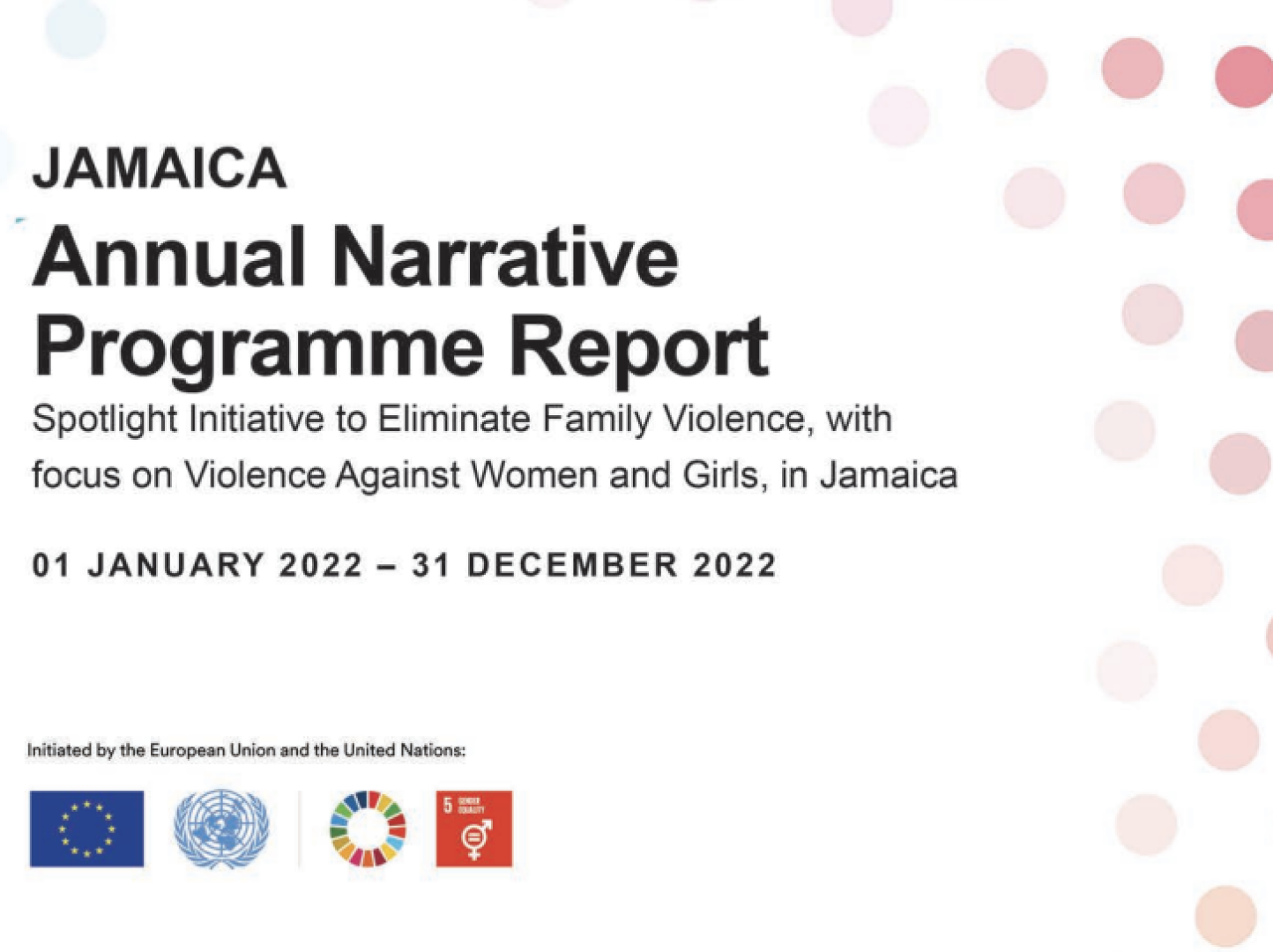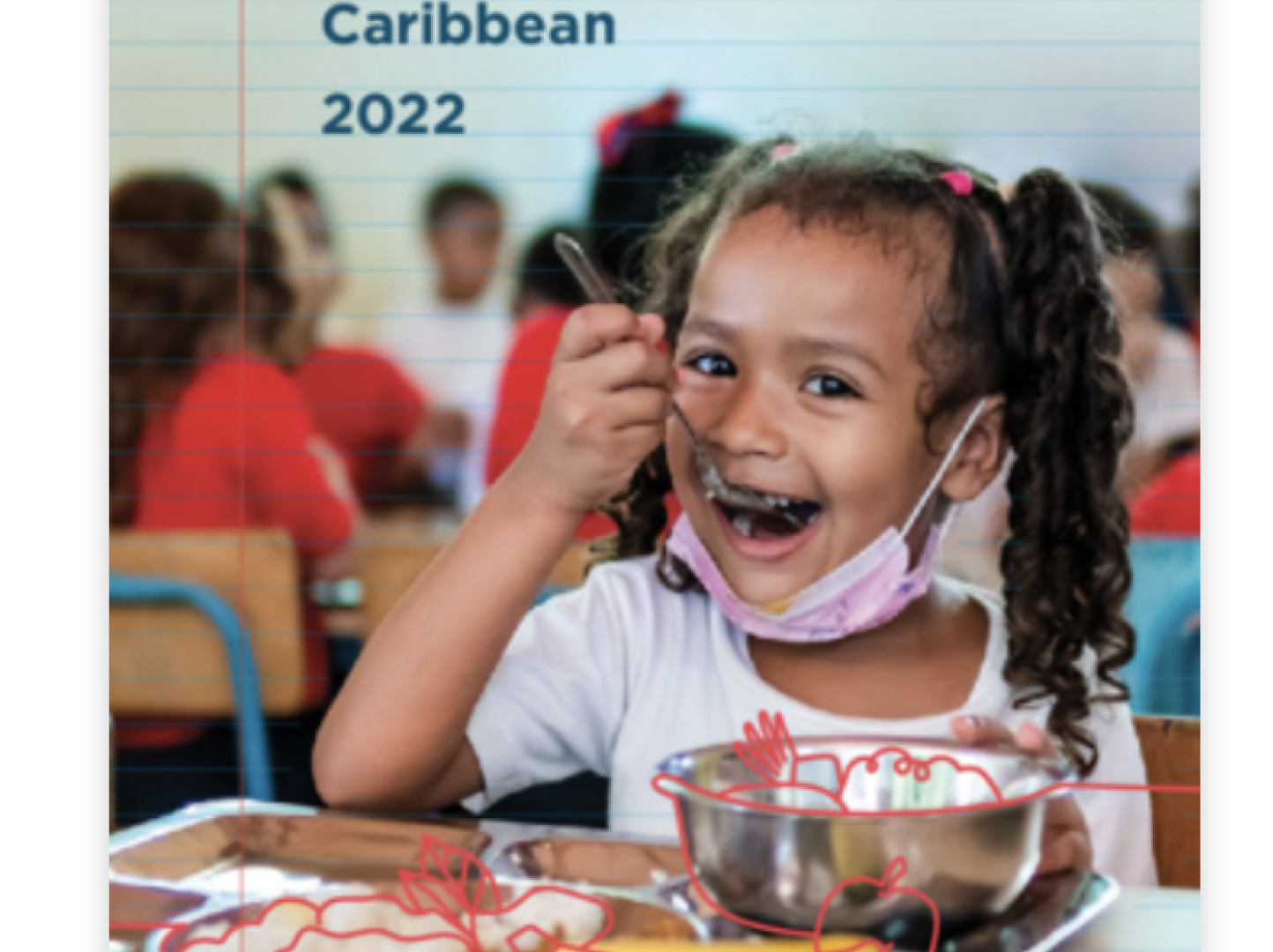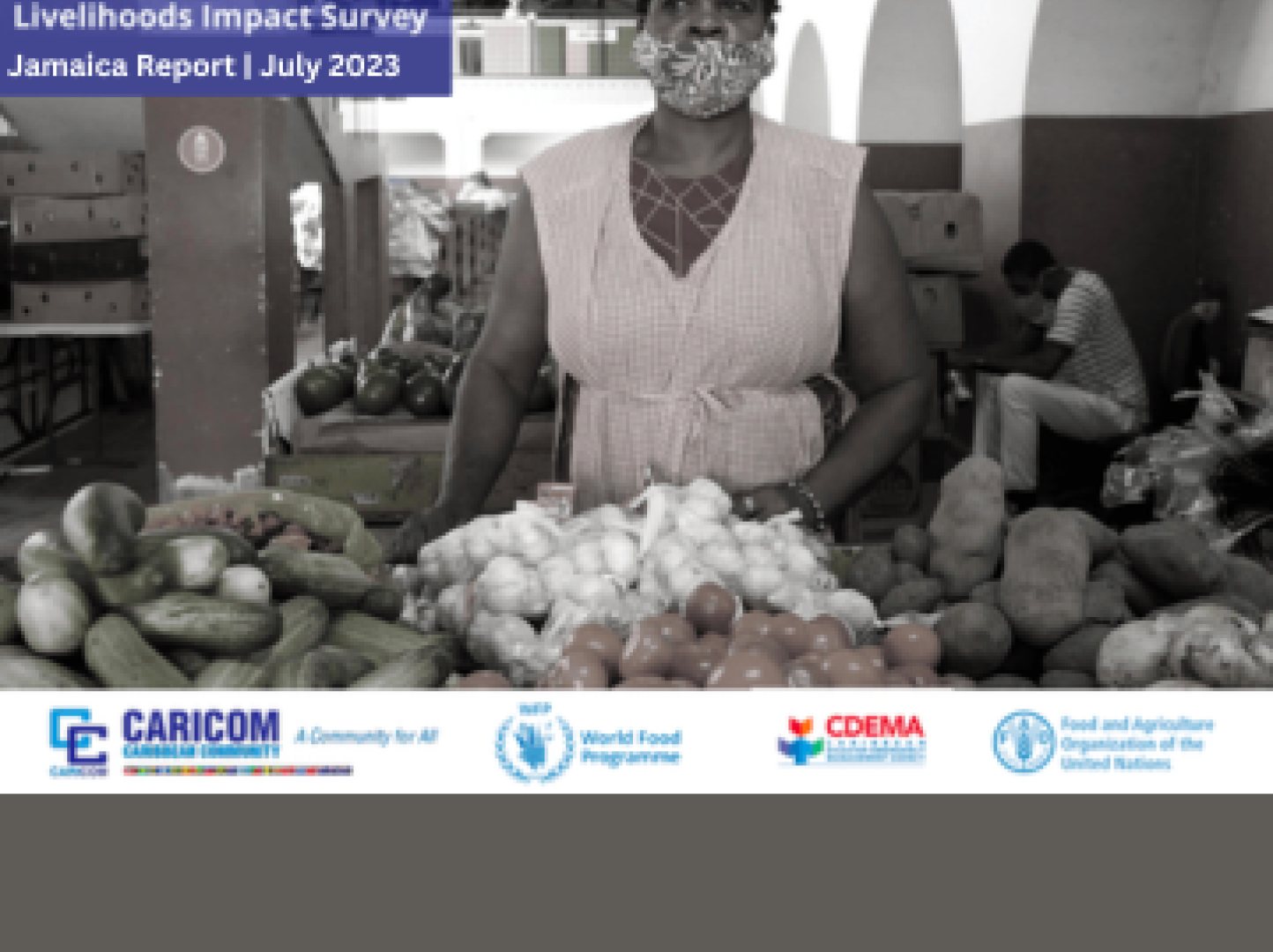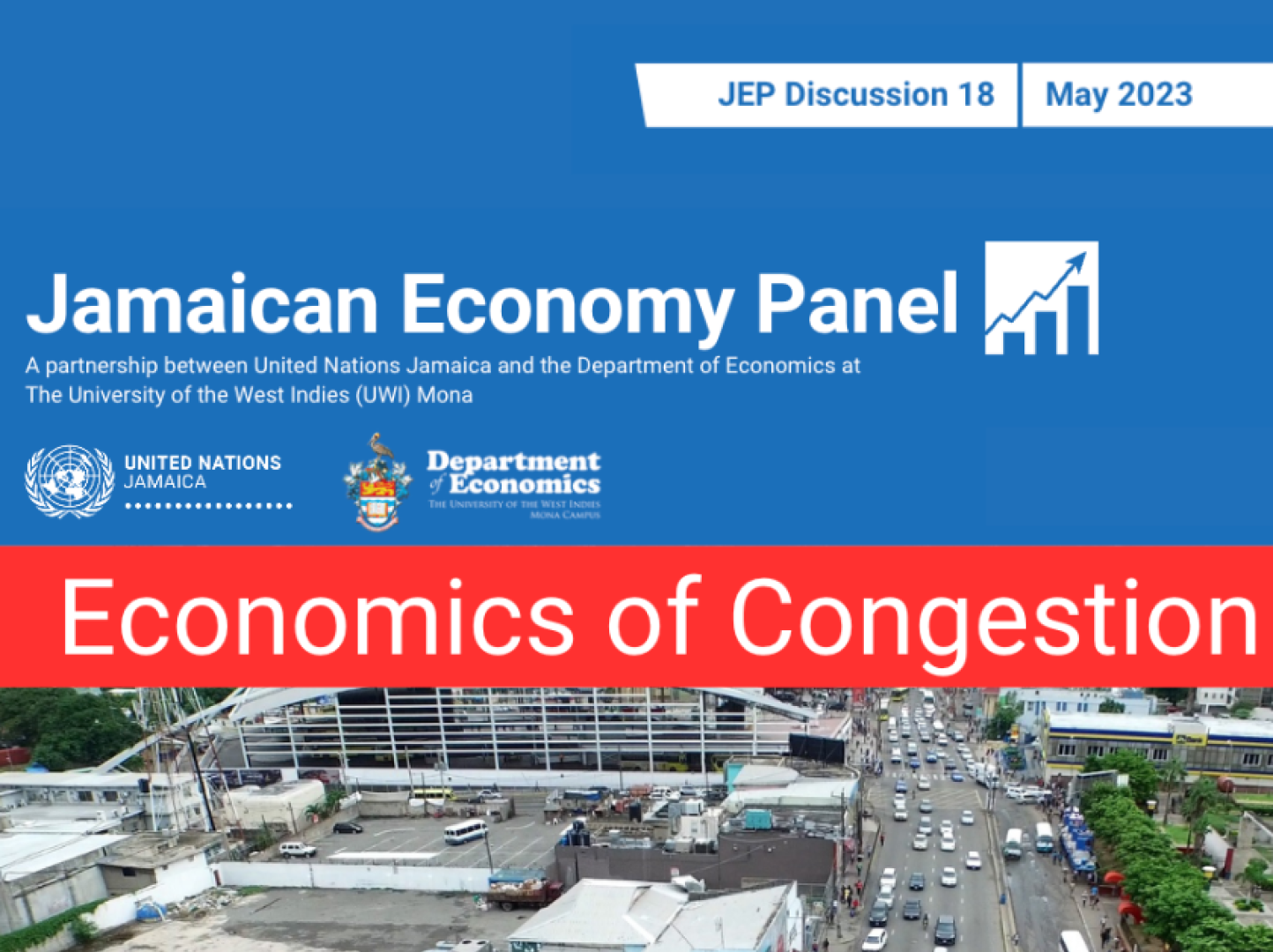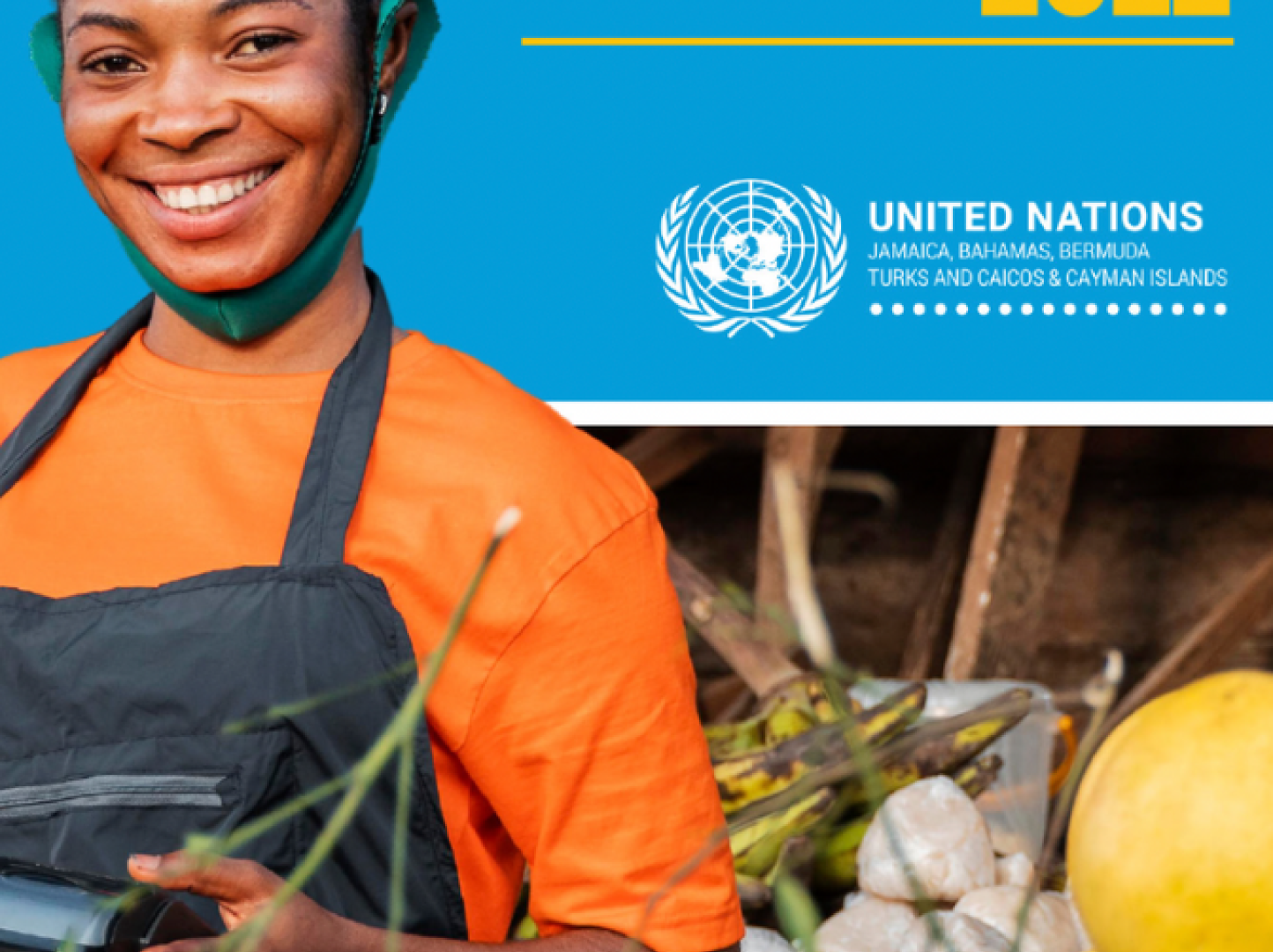Latest
Press Release
27 March 2024
United Nations and The Bahamas Facilitate Inaugural Joint National Steering Committee Meeting
Learn more
Story
24 March 2024
A Shout-Out From Jamaican and Caribbean UNVs: "We Are SIDS Women."
Learn more
Story
19 March 2024
Lock, Stock and Barrel: Jamaica takes on illicit arms and weapons
Learn more
Latest
The Sustainable Development Goals in Jamaica
The Sustainable Development Goals are a global call to action to end poverty, protect the earth’s environment and climate, and ensure that people everywhere can enjoy peace and prosperity.
Kindly note that the data visualizations show an aggregate of the Caribbean. To view the disaggregated data per country, please click on the name of the country or territory you wish to explore.
Story
04 September 2023
Honourable Minister Charles Jr endorses WFP’s training on shock-responsive social protection
Minister of Labour and Social Security Pearnel Charles Jr. on Monday endorsed the United Nations World Food Programme’s (WFP) Shock-Responsive Social Protection training as critical to building the necessary strategic and technical competencies that will strengthen Jamaica’s ability to respond to disasters.
Charles added that climatic events, which are projected to increase, helped to exacerbate social insecurity.
“The geographic position of the small island developing states within our region makes our Caribbean countries particularly vulnerable to climatic events, such as hurricanes and associated hazards including rainfall, winds, and storm surges during the hurricane season added to this, we regularly experience our share of human-induced hazards, making the Caribbean the second most disaster-prone region in the world,” he said.
“The threat is compounded by socio-economic realities, and in some instances, lack of information, that often force many of our most vulnerable population to establish their homes in river courses and other flood-prone areas, and engage in survival practices that progressively endanger their lives and livelihoods and ultimately increase our collective vulnerability to disaster,” he added.
In making the link between social insecurity and the devastating impact of climate-related disasters, Charles noted that effective social protection policies should serve to reduce exposure to risks and enhance capacity to manage shocks.
He went on to explain that in preparing for climate-related events, which are increasingly likely due to global warming, information was paramount underscoring the importance of WFP’s training programme, which he noted builds on regional evidence generated through research.
According to Charles, the information provided through the WFP’s training will serve to develop and enhance capacities to strengthen social protection systems and their scalability in response to shocks.
“Everyone has a fundamental right to social protection. My ministry is committed to its mission of delivering effective social protection services that empower individuals and their families, and so I wholeheartedly endorse the objectives of this workshop,” said Charles.
“I invite each and every person to participate fully, and to make use of this opportunity to build on our collective ability to respond appropriately to the ever-increasing exposure to disasters, natural and manmade,” he added.
The United Nations World Food Programme (WFP) training event on “Shock-Responsive Social Protection” was held from Monday, August 14 to Thursday, August 17.
Attendees included management practitioners from within the Government of Jamaica, primarily from the Ministry of Labour and Social Security and the Office of Disaster Preparedness and Emergency Management.
– Denieca Brown
1 of 5
Story
06 June 2023
United Nations Secretary General Antonio Guterres Lands in Jamaica for Historic Visit and Bilateral Talks
The UN Chief consulted with Prime Minister Holness on the impact of the climate crisis in the Caribbean and upcoming High-Level discussions on the mid-term review of the global framework for disaster risk reduction. They also discussed the situation in Haiti as well as ways of involving the international community, including Jamaica’s leadership, in efforts to reform the global financial architecture. The Secretary-General was also exposed to elements of Jamaican history, culture and academia.
Secretary General Guterres was warmly received in Jamaica on Sunday, 14 May 2023 by a delegation including the UN Resident Coordinator a.i. Vincent Sweeney – Head, UNEP Sub Regional Office of the Caribbean.
On Sunday, Guterres visited Seville Great House and Heritage Park, in Saint Ann. This former plantation is now a heritage site reflecting centuries of history in Jamaica. On Sunday evening, the Secretary-General also attended a dinner organized in Kingston by the Ministry of Culture, Gender, Entertainment and Sport and the United Nations Educational, Scientific and Cultural Organization (UNESCO).
“I was deeply impressed by stories of courage & determination of slaves who fought for freedom. This is a reminder of the urgency to fight racism & inequalities everywhere,” Guterres said.
On 15 May, the Secretary-General met the United Nations team working in Jamaica. The SG was also met by hundreds of local UN Staff and representatives from the International Seabed Authority. The UN Team shared their appreciation for the SG’s advocacy for small island developing states and encouraged his mission and bilateral talks on global financing systems.
The SG then toured a part of downtown Kingston transformed into a gallery of street art and murals by Jamaican artists. The tour was facilitated by the office of the Mayor of Kingston, His Worship Delroy Williams and Kington Creatives, one of the largest third-sector non-profits working to revitalize the City of Kingston through the creative industry.
Immediately after this visit, the Secretary-General had a bilateral meeting with the Prime Minister of Jamaica, Andrew Holness, followed by a joint press conference.
In his remarks to journalists, the Secretary-General said that when we look at today’s international financial architecture, we are facing moral, power and practical problems.
These problems, he added, are impacting countries like Jamaica and this is why it was important for him to hear the perspective of the Prime Minister to translate the dramatic needs and interests of developing countries, and of countries like Jamaica, in initiatives the United Nations is developing and beyond.
Turning to Haiti, the Secretary-General reiterated the need — expressed in his proposal to the Security Council last year — for a non-United Nations international police force to crack down on the gangs. This, he added, needs to take place in parallel with a political process.
He acknowledged that this has been a difficult exercise, but he once again asked the international community to understand that effective solidarity with Haiti is not only a matter of generosity, it is essentially a matter of enlightened self-interest because the present situation in Haiti reflects a threat to the security of the whole region and further afield.
In the afternoon, the Secretary-General visited the Bob Marley Museum, The University of the West Indies as well as the historic site of Port Royal.
1 of 5
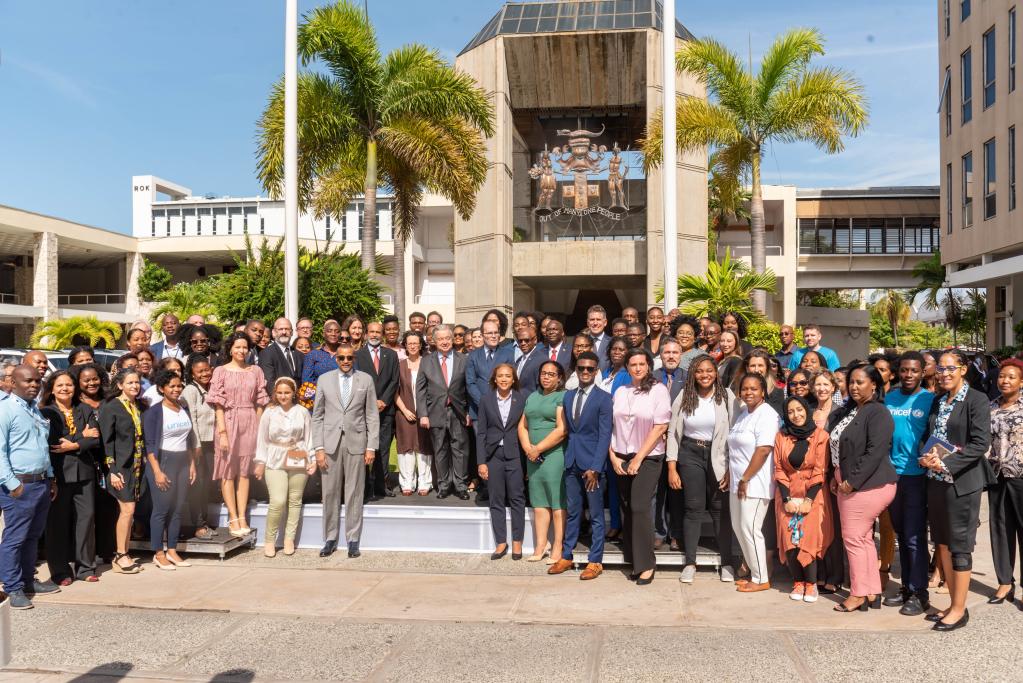
Story
08 November 2022
Multilaterial System Remains Critical in Tackling Global Challenges
These were the words of Minister of Foreign Affairs and Foreign Trade, Senator the Hon. Kamina Johnson Smith, at the flag raising ceremony commemorating Jamaica's 60th anniversary of membership in the United Nations.
“We remain fully convinced that the alternative to a functioning multilateral system is a more dangerous and divided world that will threaten to marginalise and erode the security and development of small States in particular. We must all, therefore, continue to emphasise the tremendous benefit to our nations and our people of a robust and well-functioning multilateral system,” she said.
She noted: “Small States like Jamaica are, of necessity, the strongest advocates for multilateralism and… multilateral cooperation will be key to getting us back on the road to sustainable economic growth and enhancing resilience to cope with global challenges. We must, therefore, reaffirm our commitment to a world underpinned by a strong rules-based multilateral system.”
The Minister was addressing the UN Day Anniversary Flag-Raising Ceremony at the Jamaica Conference Centre in downtown Kingston on October 24.
Senator Johnson Smith said that Jamaica will continue to play a positive role in the activities of the organs and bodies of the UN.
“We expect that their programmes and projects will complement those introduced at the national and regional levels and believe that our collective efforts will assist in achieving our own national development goals,” she said.
She noted that Vision 2030, which aligns with the overarching framework of the UN’s Sustainable Development Goals (SDG) continues to be Jamaica’s guide in this regard.
“The United Nations is the product of hope. As we mark UN Day, let us renew our hope and conviction in what humanity can achieve when we work as one in global solidarity,” Senator Johnson Smith added.
UN Resident Coordinator, Dr. Garry Conille said that now, more than ever, the institution must remain the space for constructive dialogue and a beacon for sustainable peace, prosperity and the future of the planet.
“Our modern world faces some of the greatest challenges in its history, from the climate crisis to COVID-19, from the fallout from the war in Ukraine to growing threats to democracy,” he pointed out.
Mr. Conille said that since Jamaica joined the UN in 1962, the country has played an outstanding role in the organisation’s system, helping to call international attention to matters such as human rights, decolonisation, economic cooperation, women's issues, among others.
He said that as Jamaica continues to lead an ambitious global agenda, the UN partnership in country, to accelerate progress towards the SDGs, is at its highest level.
“In the past two years alone, joint programmes have increased... with investments of the current country implementation plan already exceeding our expectations,” he said.
UN Day is commemorated annually on October 24, recognising the entry into force of the UN Charter in 1945.
This year is the 77th anniversary of the UN, and the 60th anniversary of Jamaica’s membership to the UN.
Originally published by the Jamaica Information Service October 25, 2022
1 of 5
Press Release
05 September 2022
United Nations & Bahamas Development Bank Partner in staging first Multilateral Partnership Forum focused on the Sustainable Development Goals
Today’s Forum begins at 9 a.m. and is themed, “Transformational Partnerships for a Sustainable Future.” Prime Minister, the Honorable Phillip Davis will deliver the keynote address.
The Bahamas SDG Partnership Forum 2022 serves as a platform to strengthen engagement and relationships across relevant stakeholders and sectors, leading to a more transformational whole-of-society approach to partnerships for advancing SDGs in the Bahamas – particularly in the era of building forward better from COVID-19. The public may join online via the United Nations Bahamas Facebook page.
The event features panel discussions, group dialogues and key presentations engaging a number of partners including Eugene Newry, Under-Secretary, Ministry of Foreign Affairs; Nicholas Higgs, Managing Director, Bahamas Development Bank; Nicola Virgil-Rolle, Executive Director, Lyford Cay Foundation; Samantha Rolle, Executive Director, Access Accelerator; Dave Prescott, Creative Director, The Partnering Initiative (TPI); The Hon. Obediah Wilchcombe, Minister of Social Services and Urban Development and Sumayyah Cargill, Manager, Strategic Development and Initiatives, Bahamas Development Bank, among others.
Senior officials of the United Nations will also present at the signature event. Roberto Valent, Regional Director, UN Development Coordination Office Latin America and the Caribbean, Sai Navoti, Chief of SIDS Unit Sustainable Development Goals Division, UN DESA as well as Dr. Garry Conille, UN Resident Coordinator in The Bahamas will present.
“The United Nations and The Bahamas have this year entered into a Cooperation Agreement that has already begun to yield programmes of impact for the people of The Bahamas,” Dr. Conille said.
The Partnership Forum is also the kick-off to a week-long Partnership Accelerator training programme. The 2030 Agenda Partnership Accelerator is a collaborative initiative by the United Nations Department of Economic and Social Affairs (UN DESA) and The Partnering Initiative (TPI), in collaboration with United Nations Office for Partnerships (UNOP), UN Global Compact, and the UN Development Coordination Office. The initiative aims to significantly help accelerate effective partnerships in support of the Sustainable Development Goals.
The training workshops, which include a two-and-a-half-day national training will engage over 40 local leaders with best practice skills and techniques for building effective partnerships, it will enhance understanding of relationships across participants from different sectors and launch new partnerships for supporting the implementation of the SDGs. The Caribbean Partnership Accelerator Training of Trainers workshop, with 15 regional participants, will then close out the week.
According to Aneesah Abdullah, United Nations Country Coordinator, the week’s activities are the fruits of years of partner building and networking aimed at maximizing local expertise and leveraging the service offerings of the UN Development System for the benefit of Bahamians.
“This national training will create a network of partnering champions ready to contribute to national development in new ways. From consultations with local actors, we have ensured that the agendas reflect our national priorities including issues related to climate change, the economy, education, gender and migration,” Abdullah said.
The inaugural SDG Partnership Forum is hoped will encourage and enable the development of structured partnerships to contribute to The Bahamas’ achievement of the SDGs including the establishment of a partnership mechanism to further facilitate meeting the SDGs in The Bahamas.
“From this Forum we hope to identify innovative opportunities for multiparter SDG engagement including facilitating greater access to technical and financial resources for realizing Agenda 2030. I am especially grateful to all our partners, particularly the BDB for supporting the coordination of this effort.” Dr. Conille said.
Resources -END-
Resources -END-
1 of 5
Take Action
01 May 2020
Spotlight Initiative
The Spotlight Initiative is a global, multi-year partnership between the European Union and the United Nations to eliminate all forms of violence against women and girls.
1 of 5

Story
26 March 2024
A Shout-Out From Jamaican and Caribbean UNVs: "We Are SIDS Women."
“I consider myself a SIDS woman. What is more rewarding than working for the sustainable development of your country and its people? We have creative ideas and the world can really benefit from our learning, our competencies. I got an opportunity to widen my exposure, get an international perspective, and I bring new skills and the global context back to Small Islands and Developing States,” says Wendy Elliott Williams, former UN Expert Volunteer who served as Programme Officer for UNICEF in Saint Kitts and Nevis. The Small Island Developing States (SIDS) in the Caribbean are on the forefront of multiple global crises, especially those related to climate change and weather-related disasters. Partnerships and local-level solutions are key for building resilience. Women play a crucial role in this process. Meet Wendy, Junie and Priyanka. Three women who decided to put their knowledge, expertise, and commitment to the work of the United Nations in the Caribbean. They signed up to serve as UN Volunteers, which is a Full-time commitment. CHAMPIONING YOUTH DEVELOPMENTWendy Williams is a multidisciplinary professional from Saint Kitts and Nevis with academic degrees in Chemistry, Zoology, Law, Theology, and Maritime Coastal Resource Management. With international experiences in Barbados, Jamaica, Australia, Japan, India, and the United Kingdom, she recently served as a UN Expert Volunteer with UNICEF ECA (Eastern Caribbean Region). UN Volunteers are professionals with a great sense of commitment. “If you’re really interested in the cause, then it's your passion that motivates you to make an impact. I feel rewarded and grateful.” MEET WENDY“I was the Programme Coordinator in St. Kitts and Nevis, which meant that I had to support nationally and concurrently, regional UNICEF ECA’s programmes on a wide range of issues including Child Protection, Social Protection and Social Policy, Climate and Emergency Preparedness, Youth Engagement and Social Behaviour Change.” “My greatest contributions to UNICEF include improving the effectiveness of UNICEF ECA programmes, building local awareness about UNICEF’s work, increasing the number of U-Reports* from 20 to 650, and, convening two Youth Summits on the Sustainable Development Goals, the results of which were included in the country’s Voluntary National Report. I also managed Youth Climate and Disaster Engagement Events.” WOMEN WORKING FOR WOMENThirty-year old Junie Samantha Pierre, holding an Administration degree is a journalist and an advocate for the rights of women with disabilities,. As a UN Specialist Volunteer serving with UN Women in Haiti, she provides administrative support to the Government/ Law state/ Justice department and focuses on a project that monitors and prevents political and electoral violence against women.As a woman living with a disability herself, Junie ensures that the electoral process is inclusive and accessible. MEET JUNIE“I don’t see women with disabilities just as people who have the right to vote, but as individuals capable of fully living their citizenship, including actively participating as candidates in electoral processes.” “I provide administrative and financial support to the Programme team. I develop activities, write reports, prepare presentations and recommendation papers. I also proposed and facilitated the sign language interpretation for three key activities for the first time within the office. This allowed women with hearing disabilities to access the much needed information.” Being a UN Volunteer means working with a purpose. “This opportunity with the UN builds upon my advocacy for human rights. It allows me to continue working for women’s autonomy, but at a greater scale and within an international organization.” STRENGTHENING DATA AND EVIDENCETwenty-three-year old Priyanka Mais is Jamaican, well educated with professional experience in international relations, political leadership and strategic management. She is currently completing a Master’s degree in Sustainable Development while she serves as a Data and Economics Assistant UN Youth Volunteer within the UN Resident Coordinator’s Office in Jamaica. MEET PRIYANKA“By the end of my tenure, I would have co-authored several Jamaican Economy Panel (JEP) discussion papers, which amplify awareness of critical socio-economic issues in the country. Also, I've have co-headed the development of a comprehensive data strategy, which serves as foundation for efficient data management over the next two years. For the annual UN Youth Partnership Forum in Jamaica, I supported the management of innovation hubs and co-designed a meaningful interaction between youth and UN partner organizations.” “As a Caribbean woman, I am deeply interested in the empowerment of other women. In my role as a UN Volunteer, I try to promote and mainstream gender equality across all areas of my work. For example, while writing for one of the JEP discussions, I assessed trends in youth unemployment from 2015 and their impact across gender.” THE PROMISE OF AN INCLUSIVE SOCIETY“As a Jamaican, contributing to the sustainable development of my country is more of a personal commitment, more than just a profession. I have great sense of duty and dedication to apply my knowledge and abilities to further my country, and it is an honour to work towards sustainable development here at the United Nations in Jamaica,” says Priyanka Mais, UN Youth Volunteer.In the Caribbean, there are currently over 50 women professionals serving as UN Volunteers with several UN agencies. There is room to grow. Building on women’s knowledge and experiences brings the promise of an inclusive, equitable and sustainable Caribbean. FOOTNOTES*U-Report is a UNICEF programme designed to empower youth and adolescents, motivating them to share their vision on the problems facing their communities and countries. Via free, anonymous, and accessible digital tools such as WhatsApp, Messenger, Instagram, or Telegram, participants answer surveys and provide opinions on different topics.
1 of 5
Story
20 March 2024
Lock, Stock and Barrel: Jamaica takes on illicit arms and weapons
In Jamaica, a concerted effort is underway to tackle a challenge that has long hindered progress and prosperity – the proliferation of small arms and light weapons. As the third-largest island in the Caribbean, with a population of 2.73 million, Jamaica faces the stark reality of high crime rates. Firearms, arriving through official and unofficial channels, play a pivotal role in fuelling organized crime, contributing to homicides and violence concentrated in urban and rural areas. Indeed, on average nearly 80 per cent of all homicides in the country have involved the use of a firearm.Vision 2030 Jamaica, the National Development Plan, underscores the profound impact of crime and violence on the country’s development and its impact on citizen safety and security. Recognizing the complexity of this issue, spearheaded by the United Nations, the Joint Programme on reducing small arms & light weapons in Jamaica, under the umbrella of the Saving Lives Entity (SALIENT) Fund, stands as a shining example of coordinated action and support for the island nation pooling in various actors and expertise to address both the supply and demand sides of the problem.Under the leadership of the UN Resident Coordinator’s Office, the programme leverages the strengths and expertise of four key UN entities: the UN Development Programme (UNDP), the UN Office for Disarmament Affairs (ODA), the Regional Centre for Peace, Disarmament and Development in Latin America and the Caribbean (UNLIREC), and the UN Educational, Scientific and Cultural Organization (UNESCO). Working to deliver as one, the UN Country Team has synchronized efforts to channel investments towards addressing the scourge of illicit small arms and the SDGs and national priorities, more broadly.Caption: Working with local authorities and law enforcement in Jamaica, the Programme is working steadily to build skills among these groups to detect and to prevent the use of illicit small firearms.Photo: © UN Jamaica/ SALIENT ProgrammeEmpowering Jamaica for a Safer TomorrowThrough the Programme’s targeted capacity-building sessions, law enforcement officials at the nation’s maritime and seaports, airport authorities and customs agents now boast of improved detection capabilities. The Programme is also providing legal advice and legislative support in the development of a new Firearms Bill, a legislative framework governing small arms reduction.Further, it has also facilitated meaningful research by launching the first Violence Audit conducted in Jamaica. The Audit is the first time a clear baseline has been established on the use of small arms and light weapons in volatile communities. Moreover, the inter-agency technical working group, an innovative component of the programme, has fostered increased collaboration and information sharing, ensuring a comprehensive and people-centered approach to tackling violence.The Programme has also worked closely with educators and youth to foster firearm free and peaceful school communities. Engaging closely with the Ministry of Education and Youth, the Programme has led to the establishment of clear guidelines on reducing the presence of firearms in schools, opening channels of communications to various breaches and recording incidents of use. For vulnerable youth, the Programme has been instrumental in setting up “Youth For Peace Clubs” that are helping inculcate peaceful conflict mediation skills, manage their social and emotional behaviours and tackle gender stereotypes to bring about change.One teacher, participating in the training, commented, "I really appreciated all that was shared about peace. My main take away is that peace is more than just a word but an active tool to effect positive change in all our lives and improve the quality of our lives. What I will do now is to promote peace in all my classes and guide my students to peaceful resolutions for their conflicts.”Reflecting on how interpersonal conflicts would earlier escalate into fights and the change since the Programme’s intervention, two youth participants to the training said, “I learned the difference between conflict and violence. I want to use my learnings to change the school. I want to be a change maker. I want to create a Youth For Peace Club at my school.”Caption: From undertaking a "Violence Audit" to raising awareness across parts of society, the Programme is taking a holistic approach to minimizing firearm-based violence in the country.Photo: © UN Jamaica/ SALIENT ProgrammeBeyond Borders: Impact and ExpansionThe impact of the SALIENT Joint Programme reverberates beyond Jamaica's shores. There are undoubtedly lessons learnt which can be applied to programmes safety and security across the region. Recognizing the success achieved, there is optimism for additional funding in 2024 to scale up its efforts in Jamaica and in other countries (Cameroon, South Sudan) and expand the programme, underscoring its sustainability and potential for further positive change. The Programme is also expected to be replicated in Ghana, Honduras, Panama, Kyrgyzstan and Papua New Guinea.A Unified Vision for a Safer WorldIn a world often marred by disparate efforts, this initiative stands as a testament to what can be achieved when UN entities, governments, and communities unite with a common purpose. The SALIENT Joint Programme, embedded within the Multi-country Sustainable Development Cooperation Framework (MSCDCF) 2022-2026, dovetails seamlessly with Jamaica's national priorities.In reducing small arms and light weapons, we not only secure the tangible safety of nations but also pave the way for sustainable development and the achievement of multiple Sustainable Development Goals (SDGs), including poverty reduction, health improvement, quality education, gender equality, decent work, and peace leaving no one behind.The ‘SALIENT’ Joint Programme continues to grow thanks to the generous support of the Governments of Sweden, Japan, Germany, Finland, Switzerland, France, New Zealand. For more information about the UN’s work in Jamaica, visit Jamaica.un.org.
1 of 5
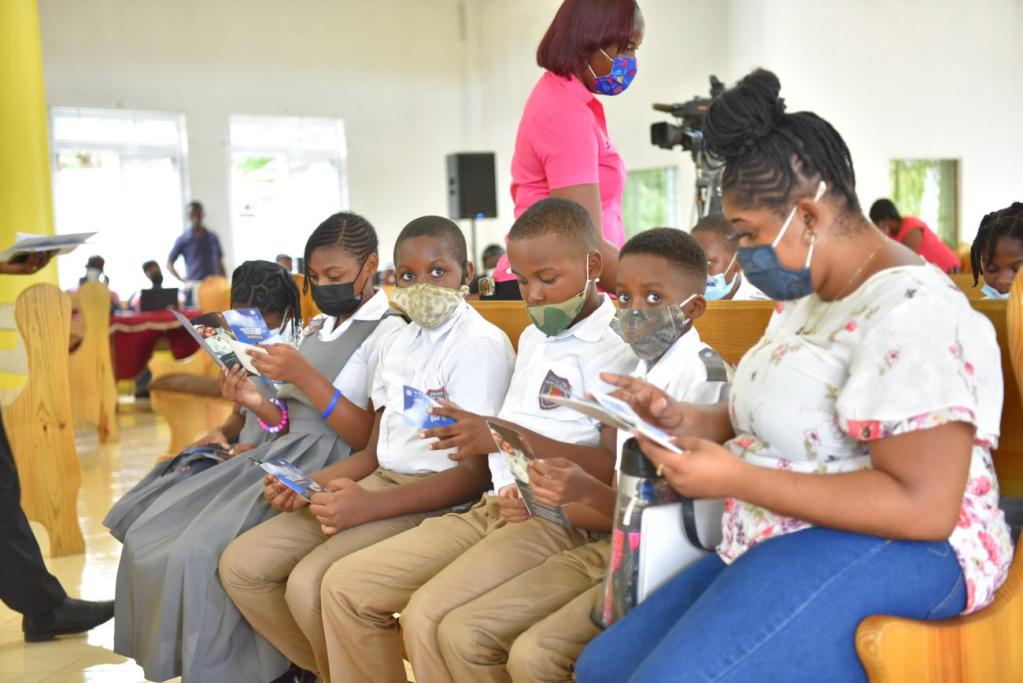
Story
07 November 2023
UN Day celebrations in Jamaica, The Bahamas and across the Caribbean: A tapestry of commitment and unity
On 24 October 1945, the United Nations Charter entered into force, giving birth to an international organisation that would become an indispensable force for good around the world: the United Nations (UN). This milestone, known as UN Day, offers an opportunity for celebration and reflection for UN member States. This includes the Caribbean, where UN Day is commemorated with fervour and a diverse array of activities that showcase the region's commitment to the principles of peace, justice, and sustainability.
This year, the call for peace and the cessation of conflicts that affect thousands of people around the world proved to be the common thread tying together UN Day activities in the region. This story explores how several Caribbean nations commemorate this occasion, highlighting their unique contributions to achieving the Sustainable Development Goals (SDGs)!
Jamaica: Threading through UN history
In Jamaica, the UN Country Team joined the Ministry of Foreign Affairs and Foreign Trade for a UN Day celebration at the new foreign affairs building in the country's capital city, Kingston.
Officials highlighted Jamaica's rich history of support for and participation in the multilateral process through the UN. Acting UN Resident Coordinator, Ian Stein, joined the Minister of Foreign Affairs and Foreign Trade, The Hon. Kamina Johnson Smith, and the State Minister in the Ministry of Foreign Affairs and Foreign Trade, The Hon. Alando Terrelonge, in delivering remarks at the ceremony, celebrating the signing of the UN Charter, the history of Jamaica at the UN, and some of the interventions the country has led at the UN General Assembly (UNGA) since becoming a member State in 1962.
Caption: Ian Stein, PAHO-WHO Representative to Jamaica and UN Resident Coordinator a.i. in Jamaica (L) Kamina Johnson Smith, Minister of Foreign Affairs and Foreign Trade of Jamaica
Photo: © RCO Jamaica
Jamaican youth representatives were also in attendance at the ceremony which saw the Resident Coordinator joining local heads of UN offices, agencies, funds and programmes to participate in several panel discussions, fireside chats and the cutting of a UN 78th anniversary cake.
Caption: Young people gathered at Hillel Academy for a UN Day celebration featuring a special cake
Photo: © RCO Jamaica
The UN in Jamaica also partnered with civil society organisation, The United Nations Association of Jamaica, for a UN Day activity that brought together scores of young people at the Hillel Academy in Kingston, Jamaica. Participants discussed and generated ideas for peace building within the context of Sustainable Development Goal 16 (SDG16): peace, justice and strong institutions. UNICEF, representing the UN Country Team, presented on digital innovations and other resources available to help youth navigate the challenges of the modern world: from mental health to skills building.
Bahamas: Youth involvement at the fabric of the UN
The UN Country team in the Bahamas celebrated UN Day 2023 with the first of its kind youth forum and panel discussion with civil society and government partners in the Bahamas.
The Resident Coordinator, Dennis Zulu, was in the country for the celebration where he participated in the youth forum, underscoring the pivotal role of the UN in supporting Bahamas’ national development priorities. The event brought together young people in their numbers to engage around the principles and values of the UN as well as the SDGs.
Photo: © RCO Jamaica
Barbados: A Parliament bathed in blue
In Barbados, the historic Parliament Building in Bridgetown was transformed into a radiant sea of blue as the United Nations collaborated with the Government of Barbados to mark the UN's 78th anniversary. This powerful visual symbolised the commitment to UN values of peace, justice, and equality for all.
Under the leadership of Her Excellency Dame Sandra Mason, the President of Barbados, the event brought together over 150 distinguished guests, including Parliamentarians, members of the senate, diplomatic representatives, civil society leaders, and private sector stakeholders. They converged in the courtyard of the Parliament for the annual UN Day Reception and Lighting ceremony.
Photo: © RCO Barbados and the Eastern Caribbean
The highlight of the evening was the ceremonial illumination of the Parliament, an act that remained a glowing testament to their commitment for a whole week following UN Day. UN Resident Coordinator (RC) for Barbados and the Eastern Caribbean states, Didier Trebucq, and the Minister of Foreign Affairs, The Hon. Kerrie Symmonds, were the esteemed individuals who flicked the switch, symbolising the unity between the government and the UN.
In addition to the formal ceremony, the evening was filled with joyous moments. Guests relished delicious food and enjoyed lively entertainment, including performances by former Calypso Monarch and Barbados' Cultural Ambassador, The Hon. Stedson "Red Plastic Bag" Wiltshire, and young steel pannist Judah Goddard. Celebrations extended to Friday, 27 October, with a Staff Day at UN House. It was a day of fun and healthy competition, including activities like the SDG Costume competition, the UN Iron Chef Competition, and a team SDG Scavenger Hunt. This day they also placed a strong emphasis on staff well-being, offering mini massages and a catered lunch.
Photo: © RCO Barbados and the Eastern Caribbean
Trinidad and Tobago: Grow local, buy local
The UN in Trinidad and Tobago hosted a reception that tapped local food artisans from vegan ice cream to steaming hot coffee brewed from locally grown beans. Trinidad and Tobago's food artisans were the stars of UN Day celebrations this year. Under the slogan “Grow Local, Buy Local”, these micro-entrepreneurs demonstrated how they grow and handcraft niche products such as chocolate, jams, cassava brownies, Moruga Hill Rice muffins, fruit bowls, and iced tea using environmentally friendly, sustainable practices.
Caption: The Alliance of Rural Communities of Trinidad and Tobago (ARCTT) showcase their sustainably grown cocoa products at UN Day celebration
Photo: © RCO/Mariela Bruzual
This significant event, organised by the UN Country Team and the Office of the Resident Coordinator, brought together representatives from various sectors, including government officials, development organisations, the diplomatic corps, civil society, the private sector, and UN staff. The occasion was marked by speeches and reflections on the UN's essential role in addressing global challenges, highlighting the country's commitment to multilateralism, sustainable development, and human rights.
UN Resident Coordinator Joanna Kazana delivered a keynote address at the reception, emphasising the indispensable role of the United Nations in a world characterised by cascading crises and complex challenges. She underscored the need for collective international efforts to address issues ranging from conflict and insecurity to climate change. Kazana's remarks reinforced the importance of upholding the values enshrined in the UN Charter, a guiding light for nations striving to build a more just, peaceful, and sustainable world.
Caption: UN Resident Coordinator for Suriname, Trinidad and Tobago, Aruba, Curaçao and Sint Maarten
Photo: © RCO/Mariela Bruzual
Minister of Planning and Development in Trinidad and Tobago, The Hon. Pennelope Beckles, also addressed the attendees during the event. Minister Beckles reiterated Trinidad and Tobago's steadfast commitment to multilateralism, sustainable development, and human rights. Her remarks reflected the nation's dedication to actively participating in global efforts to tackle pressing challenges, recognising the importance of international cooperation and the UN's role in fostering it.
Caption: Pennelope Beckles, the Trinidad and Tobago Minister of Planning and Development and Amery Browne, the Minister of Foreign and CARICOM Affairs patronise the local food stands.
Photo: © RCO/Mariela Bruzual
Minister of Foreign and CARICOM Affairs, Dr. The Honourable Amery Browne, delivered an important message reaffirming Trinidad and Tobago's commitment to the principles of the UN Charter. Dr. Browne highlighted the significance of human rights and sustainable development in the country's foreign policy and diplomatic engagements. This commitment mirrors the values upheld by the UN, making it a natural partner for Trinidad and Tobago in achieving common global objectives.
Guyana: Reaching the fourth estate
The United Nations in Guyana marked UN Day with a series of media engagements that underscored the UN's global agenda in the context of the Sustainable Development Goals (SDGs). The UN Country Team hosted a "media editors' breakfast", which also included the participation of the Guyana Press Association. The UN Resident Coordinator in Guyana, Yeşim Oruç, updated the media on the results of the UN System's work in the country. This annual engagement sought to strengthen relations with the leadership of media entities, recognising the vital role of the media as advocates for the sustainable development agenda in Guyana.
Caption: UN Resident Coordinator in Guyana Yeşim Oruç engages media editors.
Photo: © RCO Guyana/Marick Alli
On UN Day, the UN Resident Coordinator participated in television and radio appearances. Her message to the public placed emphasis on the pillars on which the UN Charter was built - peace, development and human rights. Ms. Oruç said, “…it is ultimately the actions of people and of countries that uphold the UN – the only global organisation which belongs to all nations, to all people.”
She updated on Guyana’s recent Voluntary National Review (VNR), which showcased the country’s achievements made to advance progress on several SDGs.
Caption: UN Resident Coordinator in Guyana Yeşim Oruç engages with Mark Watson on ‘The Breakfast Show’.
Photo: © UN Guyana
The UN in Guyana also hosted two special events to show appreciation to its staff: a 24 October townhall helped to reinforce the importance of the UN system in driving the national development agenda; and a staff Games Day on 27 October, added an element of fun and competition.
Photo: © RCO Guyana/Marick Ali
On 31 October, Guyana's Human Resources Working Group hosted a health fair focused on the significance of SDG 3: Good Health and Well-being. This fair provided essential health services, including dental care, vision screening, medical consultations, and nutritional consultations. The National Blood Transfusion Service was invited and led a blood drive, further emphasising the UN System's commitment to promoting good health and well-being.
Caption: UN Resident Coordinator in Guyana Yeşim Oruç participates in the health fair.
Photo: © RCO Guyana/Marick Ali
Suriname: United in SDG action
The UN in Suriname celebrated UN Day with an SDG Walkathon. The SDG Walkathon attracted more than 300 participants representing UN agencies, government partners, NGOs, diplomatic community and youth.
Caption: The UN Resident Coordinator in Suriname, Joanna Kazana, stops for a selfie while participating in the SDG Walkathon
Photo: © UN Suriname
The SDG Walkathon was an opportunity for UN agencies to showcase their vital work in Suriname, offering participants a chance to learn about the 17 Sustainable Development Goals (SDGs) and the ongoing efforts to achieve them.
Caption: SDG Walkathon participants showcase the event's hashtag while posing infront of an SDG display along the route.
Photo: © UN Suriname
Along the 5km path of the walkathon, a number of attractions were waiting for its participants including games, quizzes and photo opportunities. The impressive turnout demonstrated a genuine public interest in sustainability and understanding the global goals and their significance for Suriname's future.
Photo: © UN Suriname
Antigua and Barbuda: A symbol of hope
The Government of Antigua and Barbuda, in collaboration with the United Nations Barbados and Eastern Caribbean, celebrated UN Day with a series of activities that included a flag recognition ceremony. The event served as a symbol of hope and mutual commitment to multilateralism. The Minister of Foreign Affairs, Agriculture, Trade and Barbuda Affairs along with the UN Resident Coordinator delivered remarks during the ceremony which was attended by senior Government, members of the diplomatic corps, civil societies, and UN officials.
Following UN Day, Antigua and Barbuda continued its efforts to promote the Sustainable Development Goals (SDGs). UN Day activities continued with a beach cleanup exercise in collaboration with Adopt a Coastline, an SDG Art Competition, and more.
Grenada: Leave no one behind
The United Nations in Grenada celebrated UN Day with its annual Flag raising Ceremony and a panel discussion with youth with disabilities on the topic of ‘Inclusion’.
The UN Country Team joined members of the Government for the flag raising Ceremony on the grounds of the country's Ministerial Complex. Grenada's Minister of Foreign Affairs, Trade, and Export Development, The Hon. Joseph Andall, delivered remarks on behalf of the Government of Grenada while Grenada Prime Minister, The Hon. Dickon Mitchell, joined UN Country Coordination Officer, Feona Sandy, for the planting of a Yellow Poui tree in commemoration of the 49 years of Grenada’s membership in the UN.
Caption: The flag of the United Nations is raised and the Prime Minister of Grenada Dickon Mitchell helps to plant a Poui Tree.
Photo: © UN Barbados and Eastern Caribbean
A Panel Discussion was held at the Conference Room of the Windward Island Research and Education Foundation (WINDREF), St. George’s University (SGU). In the spirit of true partnership and engaging all in the global Act Now Campaign for the SDGs. The UN collaborated with WINDREF/SGU, FLOW and the Grenada Co-operative Bank, on the events.
Caption: Panelists and moderator at panel discussion on inclusion with youth with disabilities
Photo: © UN Barbados and Eastern Caribbean
St. Lucia: Youth debate the world we want
Over in Saint Lucia, the highlight of UN Day celebrations was an SDG Debate competition, organised jointly by the Department of Sustainable Development and the UN Resident Coordinator Satellite Office in Saint Lucia. Six students enrolled in the Sir Arthur Lewis Community College Debating Society, deliberated on the topic: The Immediate Acceleration of the SDGs is Sufficient to Meet 2030 Deadline.
Caption: Shyne Savory was among the group of young persons who proposed the SDG debate topic
Photo: © UN Barbados and Eastern Caribbean
Shyne Savory, Daryn Leslie and Cameron Gustave, who proposed that "yes" the Immediate Acceleration of the SDGs is Sufficient to Meet 2030 Deadline, emerged victorious as the SDG Youth Champions.
The audience included students from secondary schools in the north of Saint Lucia, Caribbean Youth Environment Network members, UN staff on the ground and other interested persons. An interesting feature on the programme was the SDG discussion session which provided the opportunity for a thought-provoking dialogue on the SDGs. A Saint Lucia SDG Video was also launched as part of the programme.
Saint Vincent and Grenadines: Charting the course to 2030
In Saint Vincent and the Grenadines, the UN Country Team organised several public awareness activities for their UN Day celebration. Collaborating with the Ministry of Foreign Affairs and Foreign Trade, a flag-raising ceremony was held, along with a School Awareness Session.
The School Awareness Session targeted over 35 students from the Adelphi Secondary School, educating them about the United Nations and its support for the country's national development priorities and its vision of achieving the 17 SDGs by 2030.
Caption: School Awareness Session with the Adelphi Secondary School
Photo: © UN Barbados and Eastern Caribbean
1 of 5

Story
06 September 2023
"I'm not running anymore" - How economic empowerment is breaking the cycle of violence in Jamaica
ST THOMAS, Jamaica - Fluffy chicks skip across Shelly-Ann Crossdale’s toes, as she stands in a corner of her chicken coop reading lines from a book she has been writing for years. The page of the blue exercise book marked ‘My Life’s Story’ is illuminated by a single bulb.
Ms. Crossdale is a chicken and cash crop farmer making a living in the hills of St Thomas with four of her six children and her partner. She farms and sells chicken, coffee, cucumber, corn and tomatoes on three plots of land.
Shelly-Ann Crossdale aims to write a book about her life. Photo: UNDP/Ricardo Makyn
The book she is writing brings back a lot of memories, both good and bad.
“I was sexually abused from when I was five," says Ms. Crossdale. “I was on my own from about age 14, boxed [moving around without support] from one place to the other, [experiencing] every abuse you can think of."
While still a teenager, she lived with a violent boyfriend who was also the father of her baby. One day, as he chased her through the house with a screwdriver, she told herself, "Mi nah run no more" [I’m not running anymore]. When he stabbed at her with the screwdriver, she stabbed him back and ran for her life without looking back.
Shelly-Ann Crossdale hopes that sharing her story will help others overcome abuse. Photo: UNDP/Ricardo Makyn
Charged with murder
Frightened and alone, the 17-year-old hid in a gully before begging a neighbour to let her hide her in a backyard shed. She was discovered by an angry mob that kicked, shoved and cut her.
It was the sister of her boyfriend who then informed her: "He’s dead".
“I fainted," says Ms. Crossdale.
She was charged with her boyfriend's murder and spent five months in the remand centre, where she discovered she was pregnant with her late boyfriend's child.
She was finally released thanks to a life-altering intervention. The entire attack had been witnessed by her boyfriend's son. “His son spoke on my behalf, and [told the court] it was self-defence,” she says. “The case was dismissed, and I did not get any sentence."
Shelly-Ann Crossdale farms and sells chicken meat, coffee, cucumber, corn and tomatoes. Photo: UNDP/Ricardo Makyn
Two years later, after sleeping on friends’ couches and taking odd jobs to support herself and her family, she was offered a place to stay with her grandparents.
She saved some money and used it to buy 50 chickens and materials to build a coop. “That helped my kids through high school,” she says, but theft caused the business to run down and profits to dwindle.
Ms. Crossdale and her daughter Carli-Gaye pictured at home. Photo: UNDP/Ricardo Makyn
A new start
Ms. Crossdale heard about a Spotlight Initiative-funded business and life skills training programme aimed at supporting domestic violence survivors. She enrolled with the hope of growing her business. “I told them [my vision is] to extend the chicken business, do my cash crops and get a vehicle where I can get to distribute,” she says.
The women’s economic empowerment programme is implemented by the United Nations Development Programme (UNDP) Multi Country Office in Jamaica in partnership with municipal corporations in Clarendon and St Thomas.
Eighty survivors like Ms. Crossdale completed the training with the goal of increasing their financial independence. Studies show that economic insecurity is one of the key reasons why women remain in or return to a violent situation, so financial security is a critical step to break the cycle of violence.
With financial support from Spotlight Initiative, Ms. Crossdale purchased 250 chickens, and spray pans to fertilize crops and seeds – an important resource for women farmers who account for only 32 per cent of registered farmers in Jamaica.
Ms. Crossdale's chicken farming business has flourished. Photo: UNDP/Ricardo Makyn
“It helped me a lot,” Ms. Crossdale says of the grant. “With 250 chickens, I got 500 and 600 pounds of chicken meat. Before, I harvested on average 200 pounds of chicken meat.”
Ms. Crossdale says she was most impressed with the business planning guidance and budgeting training, which is helping her to assess her true earnings from her business. “I never knew (for example) that you should deduct costs for phone cards and taxi fares used in the business. So, it helped me a lot to kind of understand how to run the business and make the business productive,” she says.
Ms. Crossdale with her certificate from the Women's Economic Empowerment Programme. Photo: UNDP/Ricardo Makyn
Looking forward
Ms. Crossdale continues to expand her horizons. “One of the things I achieved which I can be proud of is that I sent myself to nursing school and got my diploma in practical nursing," she says. "My children say, 'mummy mi proud of you. You never give up.'”
She has words of encouragement for other women experiencing violence: “Don’t give up... Even now, I tell myself I’m not finished yet... I’m going to move on to either enrolled nurse or registered nurse. I’m not stopping.”
Ms. Crossdale with her partner Dwayne Eccleston and her daughter, Carli-Gaye. Photo: UNDP/Ricardo Makyn
1 of 5
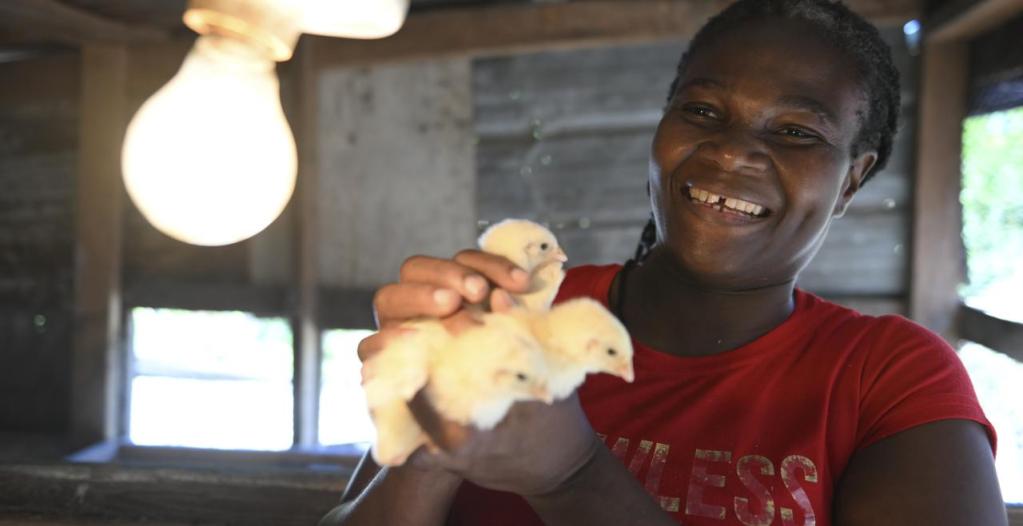
Story
06 September 2023
I’m a Different Woman Now
The night 33-year-old Avorina’s Hall’s partner rapidly punched her face six times, everything faded to white before she slumped to the floor unconscious. He was a serial cheater who abused her relentlessly, and now he had quit paying her rent. This night marked an escalation.
When she woke up, Avorina grabbed the nearest knife and lunged, but it sliced through a jug he raised to defend his chest and he fled. She knew he would return later, intent on killing her. So, she huddled in the front room with her three sons, a heavy wardrobe braced against the door. Later, he returned, kicking and pushing with all his might, but the wardrobe prevailed.
33 year old Avorina Hall has faced a lifetime of abuse, starting when she was four years old. Spotlight Initiative-funded training has equipped her with skills to overcome the trauma (UNDP/Ricardo Makyn photo).
Three nights later, he was back.
“He wanted to sleep with me and when I told him over my dead body, he got upset and threw the TV off the wall and took a hammer to the serger”, she remembers. The serger, a specialty sewing machine that gives a finished look to her clothing, is her pride and joy. In a rage, he scattered its valuable parts across her dressmaking studio.
In that crucial period of her life, something stirred.
Avorina and employee around her precious serger machine, now repaired after it was targeted by her former boyfriend. The serger ensures a professional finishing touch to garments. (UNDP/Ricardo Makyn photo)
Avorina was at the time enrolled in a small business and life skills programme under the European Union-United Nations Spotlight Initiative, soaking up lessons on her personal value, how to grow her business and how to deal with abusers. The women’s economic empowerment programme implemented by the United Nations Development Programme (UNDP) Multi Country Office in Jamaica in partnership with municipal corporations in Clarendon and St Thomas trained 80 survivors like Avorina.
The 33-year-old fashion designer is seated around one of three sewing machines she owns, tracing her journey from victim to recommitted ad determined boss of her own business.
Avorina Hall, fashion desinger, dressmaker and tailor. (UNDP/Ricardo Makyn photo)
HE KNEW ABOUT SPOTLIGHT INITIATIVE. HE KNEW WHAT WAS GOING TO HAPPEN
“I realize the reason he was so aggressive is because he saw my progress and he tried to stop it … He knew about the Spotlight Initiative, so he knew what was going to happen,” she concludes.
Then other lessons started to click.
“I never knew there was something called financial abuse. I was going through all the five abuses, and never knew I was going through so many. He called me names … he told me bad things; some things made me feel less than myself … so the Spotlight Initiative helped me a lot.
Avorina pauses, seemingly for minutes and tears flow as she processes painful memories of lifelong abuse, the latest at the hands of her son’s father. Now she has newfound hope.
"The programme taught us that whatever we are doing, be serious and don't go halfway and stop. As females we learned we can independent and help ourselves financially." - Avorina (UNDP/Ricardo Makyn photo)
AN EYE OPENER
"The programme taught us that whatever we are doing, be serious and don’t go halfway and stop. As females we learned we can be independent and help ourselves financially.” - Avorina Hall
“When I met the Spotlight Initiative it opened my eyes to many things as it has helped me to push my business further. It (taught) us how to manage our business, what to do, what not to do, and how to dress to impress. It also taught us that whatever we are doing, be serious and don’t go halfway and stop. As females we learned we can be independent and help ourselves financially.”
People can testify and see the difference within me, because the woman you see today you wouldn’t see two years ago. It’s a different, different me. - Avorina
BUSINESS HAS NEVER BEEN BETTER
Today, the abusive partner is out of her life, stricken with mental illness after repeatedly threatening to curse her. The business has never been better after applying lessons learned in the Spotlight Initiative-funded programme, and she now employs one person, she reports.
“Business is good so far to be honest because the community challenged me …right now, I never knew I could do wedding dresses, jackets, suits. Now I’m doing all that. I believe I can do ALL things through Christ Jesus who strengthens me … I only been to high school, I never go anywhere else to learn sewing, so that’s when I realize it’s a gift”, she says.
TAPPING INTO HER GREATNESS
“…(through) Spotlight Initiative I realise there are great things within me, and I need to explore it. That’s when I decided to take my business serious and wanted to move further. With the grant (I bought) another sewing machine … I would like to employ more persons in need and also train them free of cost and employ them after.
People can testify and see the difference within me because the woman you see today you wouldn’t see two years ago. It’s a different, different me. The group (fellow students) has opened my eyes to see that there is greatness in me.
Jamaica has a 27.8% prevalence rate of Gender Based Violence according to the 2016 Women's Health Survey which revealed that more than 1 in 4 women aged 15 to 64 years experienced intimate partner physical and sexual violence in their lifetime.
Through Spotlight Initiative I realised there are great things within me, and I need to explore it. That’s when I decided to take my business serious(ly). - Avorina Hall, fashion designer
TRACING THE CYCLE OF ABUSE
Avorina’s journey to a liberated business owner is in her words painful, but she wants her whole story told, no holding back. She says in order to understand her trauma, she must start at the beginning.
MY MOTHER GAVE ME AWAY 5 TIMES
When Avorina was a little girl, her mother sent her away to live with friends and relatives no less than five times. In her words, “My mother gave me away,” the only one of her 16 siblings to be treated this way. It was years before she could process her feelings of pain and bewilderment.
She was two years old when it started. By four years of age, the godmother’s husband started to molest her.
“She used to let me sleep with him. I had to make sure at nighttime I sleep in a tight skort (skirt and shorts combined), because if I don’t do it, he would molest me all through the night. While her godmother went to market in the days, she stayed out to evade abuse and was beaten on her return.
When she told her mother what happened her reply was ‘hush, he did the same to me’.
Jamaica's Child Protection Family Services Agency (CPFSA) received 9,800 cases of abuse against children in 2020. Sexual abuse accounted for 20 percent of these reports. The children’s registry reports an average of 700-800 cases monthly for 2021.
“At age 11 she (mother) gave me away again, to my grandaunt,” she recalls shaking her head. The husband also molested her, and they used her like a slave, demanding she cook, clean and do their grocery.
“When I was 13, she gave me away again”, she sighs. “That lady abused me very badly and her brother also used to molest me”.
Later she passed for Thompson Town High, but a bad sore foot prevented her from attending regularly, so she was placed in a class for slow learners. When she placed first in her exams, everyone realised she was bright.
Her mother placed her in a better school in Clarendon’s capital, May Pen, and sent food on the weekends. “Nobody was there to protect me. I could go anywhere I wanted to go. I tried suicide two times because I felt nobody loves me. When my monthly (menstruation)come, I had to cut up clothes to make pads to see me through. I have nothing, no roll on until I met my son’s father at age 16,” Avorina says.
He gave her money, sent her to school and bought her a sewing machine. Later she took her exams and earned a Grade two in Clothing and Textile.
That was the beginning of her journey into the dressmaking business.
The first time I heard I was beautiful was when I was 14. I went home and looked in the mirror and saw myself for the first time. I never used to see it because I felt nobody loves me" - Avorina Hall
Avorina wants victims of abuse to know that they are valued and that there is life after abuse.
THERE IS LIFE AFTER ABUSE
Reflecting on her choice of an abusive partner, Avorina points to the childhood trauma that left emotional scars and wounds and reinforced feelings of worthlessness.
Now she wants victims of abuse to know that they are valued and that there is life after abuse.
From troubled child to confident woman relishing her financial freedom, Avorina is determined to put the past behind her and is focused on taking her business to new heights.
FOOTNOTES
Text by UNDP Communications Analyst, Gillian Scott. Thanks to UNDP Spotlight Initiative programme manager, Shellian Forrester and thanks to teams from St Thomas and Clarendon Municipal Corporation and Clarendon Parish Development Benevolent Society for facilitating the interviews. Photos by Ricardo Makyn for UNDP Multi Country Office in Jamaica.
1 of 5

Press Release
05 April 2024
United Nations and The Bahamas Facilitate Inaugural Joint National Steering Committee Meeting
NASSAU – The Bahamas' Joint National Steering Committee (JNSC) for the United Nations Multi-Country Sustainable Development Cooperation Framework (MSDCF) held its country-level meeting on March 26 with the Sustainable Development Goals Unit (SDGU), Office of The Prime Minister and the UN Resident Coordinator’s Office. Representatives from various Ministries and Departments within the Government of The Bahamas, alongside UN Resident Coordinator Staff and UN agency representatives, were in attendance, virtually and in person. During the meeting, Co-chairs Mr. Dennis Zulu, UN Resident Coordinator and Director Rochelle Newbold, SDGU, communicated the significance of collective action in accomplishing the goals outlined in the MSDCF and its accompanying country implementation plan (CIP). The Multi-Country Sustainable Development Cooperation Framework (MSDCF) for the English and Dutch-speaking Caribbean spans from 2022 to 2026 and is the roadmap for coordinated development support agreed to by regional member states including The Bahamas.The MSDCF is the foremost instrument for planning and implementing UN development initiatives that align with the 2030 SDG Agenda and The Bahamas’ national development priorities. UN agencies and national governments, including The Bahamas, endorsed the Cooperation Framework, for the first time in 2022."The Joint National Steering Committee is very important to the transparency, monitoring, and accountability of UN-Bahamas programme implementation," Co-chair Zulu said. "This meeting is being held at an opportune time because it allows us to focus on the specifics of the Country Implementation Plan, in the case of The Bahamas." Co-chair Zulu added."This is a meeting that has been long anticipated. Most of you may recall that when this administration took office, this was one of the first undertakings that it committed the country to be a part of, this regional MSDCF," Co-chair Newbold said. “We are very excited and willing to [partner]," Co-chair Newbold added. The meeting featured a short presentation on the MSDCF's focus and structure and a summary of the key focus areas under The Bahamas' 2022/2023 country implementation plan (CIP). The CIP results will be published in an upcoming annual report. Representatives from relevant UN agencies also gave updates on the annual results review and achievements for 2023, including a presentation on the 2024/2025 country implementation plan. Critical discussions during the meeting centred around potential and new collaborations as well as best practices and capacity building. Participants engaged in fruitful dialogue, exchanging insights and perspectives to address technical and procedural gaps, and explored future opportunities for successful partnerships and programme implementation. The meeting came to a close with practical recommendations for Ministries and Departments to adopt the most effective methods to advance the work of the CIP. The SDG team pledged to support Ministries and Departments in advancing their work. The United Nations recommitted to greater momentum, and engagement with the JNSC to advance and sustain its effort in The Bahamas.
1 of 5
Press Release
17 January 2024
Economists Highlight Six Transitions Framework as Accelerator for Vision 2030 and the Sustainable Development Goals in Jamaica
The JEP inquiry addressed the relevance of these transitions, potential prioritization, identification of gaps, and consideration of redundancy in the Jamaican context. The panel discussion and the Six Transitions prioritized investments in six overarching areas: education, gender equality, health, sustainable energy, food, cities, and digital innovation can significantly enhance countries' ability to meet their SDG targets.
According to Dr. Nadine McCloud, Senior Lecturer, Department of Economics, University of the West Indies Mona, the SDGs are essential metrics for measuring the improvements in our citizens' lives and livelihoods. Thus, we must recognise the importance of achieving marked progress.
“Despite being stymied by the pandemic, Jamaica's significant upward trend in the SDG goals deserves commendations. This upward trend must continue, and the next few years are critical. Jamaica must devote more resources to building resilient food security mechanisms, digital connectivity systems, climate change buffers, and deepening our human capital to continue on this positive path. Given the global technology revolution, we must consider utilising artificial intelligence to expedite reaching the SDGs,” Dr. McCloud said.
Current global assessments of the Sustainable Development Goals indicate we are falling behind - globally. The 2023 Sustainable Development Report highlights that only 1 in 8 SDG targets is on track, and UNCTAD's 2023 World Investment Report reveals an increased annual investment deficit of US$4 Trillion, up from US$2.5 Trillion in 2015 when the SDGs were adopted. Jamaica, presently ranked 82nd, surpasses the SIDS (63.9) and Caribbean (65.9) averages with an SDG performance score of 69.6. However, urgent challenges persist, requiring prompt action to achieve its goals.
Responding to the survey results, Mr. Dennis Zulu, United Nations Resident Coordinator, agreed that “Achieving these goals demands ongoing collective efforts and partnerships with various stakeholders to design, finance, and implement policies, projects, and programmes in the years to come.” He emphasised that “The United Nations and the government must collaborate to champion the Six Transition areas and accelerate SDGs in Jamaica through strategic partnerships.”
Overall, the JEP Panellists' discussion concluded that significant progress has been made in some areas, like gender equality and decent work, however, Jamaica will still need to accelerate its efforts in the coming years. As highlighted by Dr. Stuart Davies, Senior Economist, UN Resident Coordinators Office.
“With the clock ticking, designing investments and development pathways to accelerate multiple SDGs will be critical if Jamaica is to meet its sustainable development targets by 2030. How Jamaica takes the best from global guidance and practice on transformation, and fine-tuning this to its sustainable development needs in the coming years will be an important determinant of success,” Dr. Davies said.
The Jamaican Economy Panel is part of a partnership between the United Nations Resident Coordinator’s Office (UNRCO) and the Department of Economics at the University of the West Indies (UWI) Mona. The JEP brings together economic, public-sector experts and development practitioners to address monthly socio-economic questions. These questions help to highlight relevant economic issues and the collective expertise of the panellists.
For more information on the Jamaican Economy Panel and the results of this JEP discussion, visit the UN Jamaica website.
###
For further information, please contact:
United Nations: Dr. Stuart Davies, Senior Economist. Email: stuart.davies@un.org
Department of Economics, University of the West Indies: Dr. Nadine McCloud, Senior Lecturer, Email: nadine.mccloud02@uwimona.edu.jm
1 of 5
Press Release
09 October 2023
UN Inks New Partnership with the University of the West Indies
The UN-UWI Declaration of Intent strengthens cooperation in meeting the 2030 agenda for sustainable development in the Caribbean.
The Agreement is built on the three (3) pillars of UWI’s Strategic Plan; Access, Alignment and Agility and the four (4) pillars of the United Nations Multi-Country Sustainable Development Cooperation Framework (MSDCF) – the UN roadmap for development within the English and Dutch-speaking Caribbean.
The Declaration of Intent (DOI) was signed by Professor Densil A. Williams, Principal, UWI Mona on behalf of the University and Mr. Dennis Zulu UN Resident Coordinator on behalf of the United Nations system in Jamaica. The signing was hosted at UWI’s Regional Headquarters.
“The latest performance assessment of the SDGs from the UN Sustainable Development Solutions Network shows that on average less than one-fifth of the SDG targets are on track to be achieved,” Zulu said.
“It is, therefore, crucial that we all do our best to enhance partnerships, forge enduring collaborations and pool ideas and expertise to support Jamaica and the region in meeting its SDG targets. This UN-UWI partnership aims to do just that,” Zulu added.
The ceremony featured brief presentations from Dr. Stuart Davies UN Senior Economist, and Dr. Nadine McCloud, Senior Lecturer, Department of Economics.
“The research we’ve done so far indicates significant interest in programmes of SDG focus. This [partnership] is timely. As a university, we are in discussions with other international partners which will see us launching academic programmes in social justice and specifically around the SDGs, so as an institution, we can assist Jamaica and the world in ensuring we achieve the SDGs,” Professor Densil A. Williams, Principal, UWI Mona said.
The Declaration identifies initial areas of collaboration including economic transformation and resilience-building for the SDGs, financing for sustainable development, knowledge generation and sharing, data capacity development and others.
“Partnering with the United Nations helps us ensure that no one is left behind in economic or educational gains; whatever we do,” Professor Williams said.
The DOI is signed on the heels of UN Jamaica’s youth partnership Forum aimed at refocusing efforts around the achievement of the 2030 Agenda for Sustainable Development Goals (SDGs). The one-day event is hosted at UWI’s Regional Headquarters.
“Today’s signing is not just symbolic of our continued commitment to Jamaica, but a step forward in strengthening UN’s partnership with UWI as a key partner in the sustainable development of Jamaica and the region,” Zulu said.
1 of 5
Press Release
09 October 2023
United Nations and Partners Announce Package of Youth Services at Partnership Forum
The Forum is being held under the theme “Partnerships for Peace, Planet and Prosperity. For Youth. By Youth. With Youth.” The United Nations and its partners will announce a host of service offerings for youth and sign a new UN partnership with the University of the West Indies (UWI).
Additionally, the Forum provides the opportunity for Jamaica’s youth leaders to build partnerships for SDG implementation and share and learn about efforts for SDG acceleration.
This year’s forum features the launch of the UN’s first Youth Engagement Action Plan for Jamaica, the signing of UN’s Declaration of Intent for greater partnership with the UWI, Mona as well as a series of interactive dialogues, breakout sessions and panels from The Ashe Company, The British High Commission, Jamaica Animation Nation, Jamaica College Robotics, The Heart Foundation of Jamaica, The Planning Institute of Jamaica, The Jamaica Constabulary Force, and others; with a live outside broadcast with Chiney K and the FYAH Fam on 105.1 FM. The initiative will also see key remarks from The Hon. Marsha Smith, MP, State Minister, Ministry of Education and Youth, Mr. Deanroy Bernard, Permanent Secretary, Ministry of Culture, Gender, Entertainment and Sport, Mr. Dennis Zulu, United Nations Resident Coordinator and Professor Densil A. Williams, Principal, UWI, Mona.
In a UN first, the keynote presentation features a live address from Ronald J. Taylor, Global Youth Safety and Wellbeing Product Policy Manager at TikTok.
The one-day event will see over 200 youth attendees and partners building their capacity to support Jamaica in delivering on Vision 2030 and the Sustainable Development Goals through shared best practices, innovation and partner-building.
“This Youth Forum unfolds against a backdrop of complex national and regional issues, including national youth priorities around education, employment, gender-based violence, safety, wellness, a relentless climate crisis coupled with the gradual but uneven recovery from the pandemic,” said Dennis Zulu, United Nations Resident Coordinator.
“Admittedly, progress towards achieving the global goals by 2030 is off track. Now more than ever before, it is critical that we empower Jamaica’s youth, by amplifying their voices, their expertise and their innovative ideas to get us back on track to achieve Vision 2030 and the SDGs,” added Zulu.
###
1 of 5
Press Release
09 October 2023
Jamaican Economy Panel Commends Reduction in Youth Unemployment and Debates Options for its Continued Decline
The JEP panellists were asked about how COVID-19 has impacted the labour market, what challenges, and opportunities are faced by Jamaica’s youth, and the potential options available to policymakers and development practitioners to support employment for Jamaica’s youth in the coming years.
Like many Small Island Developing States (SIDS) across the Caribbean, providing sufficient labour market opportunities, particularly for youth (15 to 24 years), continues to be a challenge for Jamaica.
Over the past decade, official statistics show that the average overall unemployment rate has been in double digits (11% from April 2013 to April 2021), which for youth has been much higher at 27%. In recent years, the trend has been decreasing, but unemployment remains high for Jamaica’s youth. An interesting development in Jamaica's labour market has been the convergence in unemployment rates between men and young women. This has been so significant that in July 2022, the unemployment rate among young women fell to below that of young men. A marked departure from the trend.
Dr. Nadine McCloud, Senior Lecturer, Department of Economics, University of the West Indies Mona, stated “High and persistent youth unemployment undoubtedly cast significant costs on individuals and society. Young people face a double-edged sword. On the one hand, young people have fewer years of work experience; are uncertain about their niche, operate in smaller networks, and if employed, are less costly to replace compared to more experienced adult counterparts in comparable industries. On the other, they are technologically agile and receptive to new skills, which in this digital era, can offer Jamaica a demographic net dividend.”
Responding to the survey results, Mr. Dennis Zulu, United Nations Resident Coordinator, agreed that “addressing youth unemployment necessitates a collaborative effort between the public and private sectors, fostering opportunities for our youth through diverse initiatives and programs to achieve SDG-8 in Jamaica.” He emphasised that “it is essential for the United Nations to partner with the government, working in tandem to champion gender equality, poverty reduction, and the promotion of decent work and economic growth through strategic partnerships.”
Overall, the JEP Panellists' discussion concluded that youth unemployment in Jamaica remains a complex and difficult problem to solve.
“Root and branch approaches will be needed to both bridge employers current as well as future needs from their workforce to remain competitive both domestically and internationally,” Dr. Stuart Davies, UN Senior Economist, said.
“Enhancing the skills of young people to ensure that they are best equipped to reach their full potential, is crucial to Jamaica’s economic transformation, future prosperity, and strategy to deliver on its Sustainable Development Goals, particularly SDG-8: Decent Work and Economic Growth,” Dr. Davies added.
The Jamaican Economy Panel is part of a partnership between the United Nations Resident Coordinator’s Office (UNRCO) and the Department of Economics at the University of the West Indies (UWI) Mona. The JEP brings together economic, public-sector experts and development practitioners to address monthly socio-economic questions. These questions help to highlight relevant economic issues and the collective expertise of the panellists.
For more information on the Jamaican Economy Panel and for the results of this JEP discussion, visit here.
1 of 5
Latest Resources
1 / 11
Resources
17 January 2024
Resources
09 October 2023
Resources
06 September 2023
1 / 11

